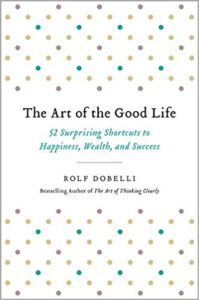
 Title: The Art of the Good Life: 52 Surprising Shortcuts to Happiness, Wealth, and Success by Rolf Dobelli
Title: The Art of the Good Life: 52 Surprising Shortcuts to Happiness, Wealth, and Success by Rolf Dobelli Published by Hachette Books
Published: November 6th 2018
Genres: Non-Fiction
Pages: 272
Format: Trade Paper
Source: Publisher
Goodreads
For the most part, I liked this book. I don’t think it’s ultimately got anything life-changing in it. However, I do think it serves as a good reminder in how to think about what you want in your own “good life.” Not every self-help book is going to be the cure, but I think if you read them critically and think of ways to apply someone else’s thought processes to your own life, you might make your own discoveries.Since antiquity, people have been asking themselves what it means to live a good life. How should I live? What constitutes a good life? What's the role of fate? What's the role of money? Is leading a good life a question of mindset, or is it more about reaching your goals? Is it better to actively seek happiness or to avoid unhappiness?
Each generation poses these questions anew, and somehow the answers are always fundamentally disappointing. Why? Because we're constantly searching for a single principle, a single tenet, a single rule. Yet this holy grail -- a single, simple path to happiness -- doesn't exist. Rolf Dobelli -- successful businessman, founder of the TED-style ideas conference Zurich Minds, bestselling author, and all-around seeker of big ideas -- has made finding a shortcut to happiness his life's mission. He's synthesized the leading thinkers and the latest science in happiness to find the best shortcuts to satisfaction in THE ART OF THE GOOD LIFE, his follow up to the international bestseller The Art of Thinking Clearly (which has sold more than 2.5 million copies in 40 languages all around the globe).
THE ART OF THE GOOD LIFE is a toolkit designed for practical living. Here you'll find fifty-two happiness hacks - from guilt-free shunning of technology to gleefully paying your parking tickets - that are certain to optimize your happiness. These tips may not guarantee you a good life, but they'll give you a better chance (and that's all any of us can ask for).
I read it in short bursts over lunch breaks over the course of a week, and I think it’s best read in little bits rather than all at once. In fifty-two essays, Rolf Dobelli tells us how to live a good life. The essays focused a lot on modesty, on not being overly flashy, that the “mediocre” is often okay. Some of it I agreed with, some of it I was ambivalent towards, and some I disagreed with. The bits about saving and not overspending and overextending yourself I agreed with. We all have a limited resource of time, focus, and energy, and we should be mindful of where we spend those resources.
However, when it came to the subject of giving back to the community, Dobelli suggests that it’s better to just throw money at it and not worry about it otherwise. Living the “good life” to me is not about throwing money at something and forgetting it exists. If I can donate some energy and time to making someone else’s life a little bit better, I feel like I’d get much more out of it than just by donating money. Granted, some of the examples he gave were giving money rather than volunteer tourism, but what about in your local community? The examples Dobelli gave sometimes felt like he’d rather hole himself up inside and not communicate with other people because it’s too exhausting. For me, I think one of the key points of a good life is the relationships and connections you build with other people and your community.
The best ideas out of this book that I needed to be reminded of is the circle of competence (doing what you’re good at), the five-second no (because saying yes all the time is not always a good thing), and a circle of dignity (your foundation, essentially). I know I can devote myself to being good at a lot of things, but I would ultimately rather focus my skills and attention on being great at a few things. Saying no and saying yes without a second thought will ultimately give you more work and stress than you’re expecting, so it’s good to take a few moments to consider it and give a response that’s true to you and your foundation. And you can’t have a foundation until you’ve lived a little, lost a little, and experienced the world in real time. I enjoyed the afterword a lot, too, as it made the entire thing a little more personal to Dobelli.
If you’re looking for a bite-sized pick-me-up based on research and using real-life examples, you might enjoy what you find in here!
Thank you to Hachette for sending me a complimentary copy to review!
